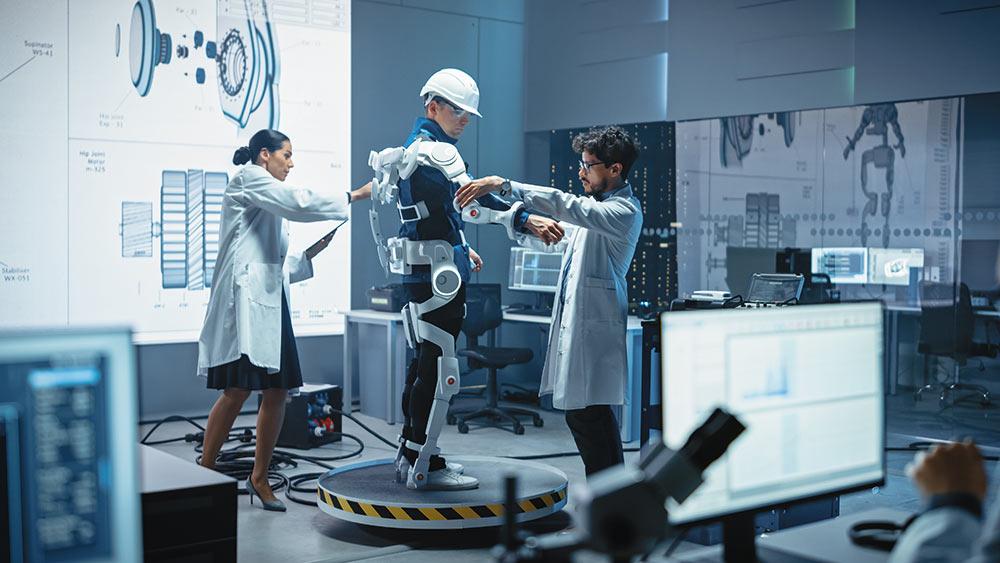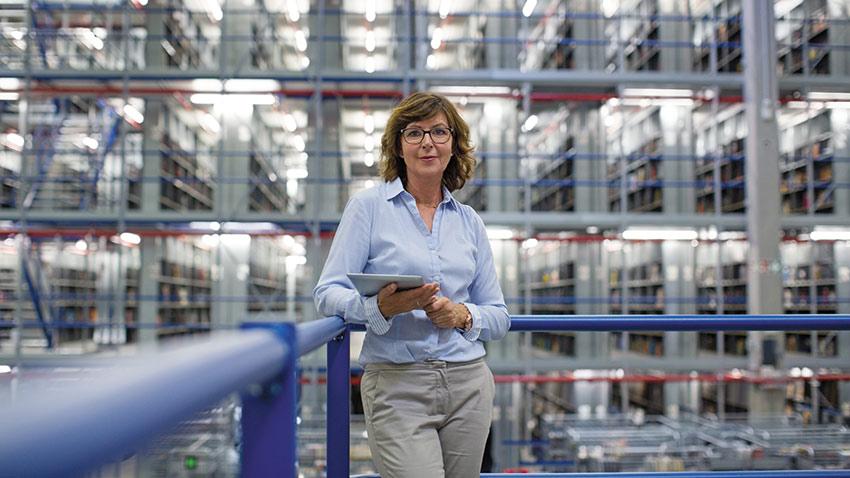In this fourth and final part of our blog post series on “The Warehouse of the Future”, we focus on the people in and around the warehouse. What new people skills will you and your employees need to be successful in your logistics? Curious to know what else the warehouse of the future has to offer? Read our other articles on increasing warehouse automation and the advent of greener logistics.
Times are changing and humans are following suit. For several years now, recruitment in the logistics industry has become increasingly complex. Employees are looking for rewarding jobs in companies with shiny employer brands. Yet productivity in the warehouse needs to increase… And it seems increasingly difficult to retain operators in these conditions. Will the technology at work in the warehouse of the future make it dehumanised? Are we heading for 100% robotised logistics, with only engineers working directly on the supply chain? You will discover that, despite appearances, the warehouse of 2050 will probably be more human than the one of today.
Fewer humans in the warehouse, but a more humane warehouse
In the space of just a few years, the logistics professions have changed fundamentally. Whereas they used to attract people who went into them ‘out of spite’, the recruitment process in warehouses now includes people with at least a bachelor’s degree who are looking for a rewarding career. It is at this point that many companies have decided to use technologies designed to reduce the arduousness of logistics tasks or the insecurity of certain missions, in order to increase productivity and make their jobs more attractive. A paradox then arises: there are fewer humans in the warehouse, but more consideration is given to the human element.

When a company decides to implement a new technology, the expected benefits must enable it to increase its flow processing capacity at a better cost. What technology can absorb is not incompatible with preserving, or even developing, human resources. With the increase in the processing capacity of the concomitant flows, the workload that remains based on the actions of employees is potentially preserved, or even increased, but on modified tasks. The resources freed up by the technology can be reinvested. In a win/win situation, any change in technology is not necessarily to the detriment of employment.
Yvan Delannoy, Logistics Operations Director, RAJA GroupExoskeletons and drones: indispensable for your employees?
Exoskeletons are an interesting example of this phenomenon. While they can relieve the burden of carrying heavy loads, for the time being they are not a technology that is very applicable to logistics, as the risk/benefit balance is not very attractive. What’s more, by deploying exoskeletons for repetitive tasks, companies are certainly relieving their employees of arduous tasks, but they are increasing the monotony and single-tasking aspect of a mission.
The same applies to drones. They can pick up goods or information at height, to limit the risks to operators. Or they can detect damaged structures, such as racks. Here again, it’s crucial not to present them as technologies that replace human beings, but rather assist them. The technology performs the task. And the operator becomes the pilot of this technology, to control or analyse the data collected.

The key to successfully implementing a new technology is to design it to serve multiple activities. It can be used to help people, not just to replace them. This goes against the grain of the mono-activity that has been firmly established in warehouses for decades. A forklift operator is not a picker, an inventory clerk is not a producer, and so on. To achieve this, technology must be flexible and accessible. It must enable us to rethink the logistics professions to make them more attractive, less monotonous and less arduous. This is essential if we are to renew the generations.
Yvan Delannoy, Logistics Operations Director, RAJA Group
Developing new skills as a key to success
New technologies in the warehouse necessarily mean new skills to manage these innovations. That’s why, in the decades to come, warehouses will be equipped with new professions. Data analysis to optimise productivity, data scientists to predict stock management, engineers for continuous improvement, automation, etc.

We're going to see a migration from physical power to intellectual power. Particularly in terms of logistics processes and methods. All the heavy and arduous tasks will be entrusted to robots. And every human being will be asked to provide real added value, where the human brain is a plus compared with Artificial Intelligence.
Adrien Soulier, Managing Director of WIIOBut what about the operators who currently work in the warehouse? They too will see their jobs change, and for the better. The more technology and innovation penetrate the warehouse, the higher the level of basic skills will have to be. Companies will have to consider genuine skills development plans for their operators, to teach them how to master the technologies and maintain them.
More autonomy for your employees
Beyond simple skills in technology, another quality will become essential for operators: autonomy in the face of this technology. Of course, we can imagine Artificial Intelligences capable of carrying out robot maintenance. But with many other innovations, the operator will remain central to ensuring the efficiency of the machines: hence the importance of recruiting employees who know how to be autonomous when dealing with them.
The jobs of order pickers are changing, and so is their knowledge, in order to adapt to new technologies. We’re no longer talking about simple handling! This is where technology becomes a real recruitment argument. Thanks to technology, we can make the day-to-day lives of our employees easier, by making their jobs less arduous. We offer them less repetitive, less boring tasks, and we involve them in the processes, so that they can give their opinion on possible areas for improvement. That’s why we need to succeed in attracting employees with more technical, higher-level skills and an appetite for IT and technology.

This is the role of the manager who, in addition to this, has to find solutions to combat RSI and improve safety, by allocating large budgets for appropriate investments in automated machines (strapping machines, wrapping machines), or automated tables to help with gestures and postures. But what employees want most of all these days is autonomy. That's what the future of the warehouse is all about: people choosing a company based on criteria such as autonomy, trust, responsibility and the management we offer them.
Thierry Bernard, Logistics Director, Logisorgues (RAJA Group)
A new management style
Logistics managers have always had a crucial role to play: as well as simply giving orders, they had to be able to make the most of the work of their employees, who were part of a population with minimal training and fairly simplistic tasks. In the years to come, these managers will be welcoming new talent, who they will have to train in logistics innovations, but also communicate with effectively. Their challenge? Valuing their operators, while explaining their added value in an automated, digitised, robotised world.
In addition, the logistics and supply chain manager himself will have to face more and more challenges in his day-to-day work. Technological and regulatory changes, which are becoming ever more prevalent in a constantly changing world, will require them tobe constantly on the lookout and to take agile decisions.

The major crises that companies have experienced in recent years have placed logistics at the heart of organisations... Which was not necessarily the case before. This puts the supply chain director in a position he didn't have before. He is taking on more weight and becoming a strategic player for the company. That's why he now has to be able to get through crises, by imagining downgraded, risky scenarios. In a way, they are becoming crisis managers.
Laurent Sabatucci, Founding Partner of EOLAre you ready for a more humane future?
Far from the robotic image we might imagine, the warehouse of the future will also be resolutely human. Gone will be the days of tedious work and repetitive tasks. Instead, we’ll be taking into account the expectations of our employees, working on a range of activities and developing skills to meet the challenges of recruitment and retention. Only warehouses that strike the right balance between technology and people will succeed in meeting the logistics challenges of tomorrow. Are you ready?

The warehouse of the future will still be human, but "differently human". Technology will replace humans for certain tasks. But this technological evolution will relieve operators, limit Musculoskeletal Disorders a little more, and allow them to reach more qualified positions. And that's also the future of logistics... Succeeding in attracting employees with the new values that this technology conveys: autonomy, confidence and responsibility.
Thierry Bernard, Logistics Director, Logisorgues (RAJA Group)













